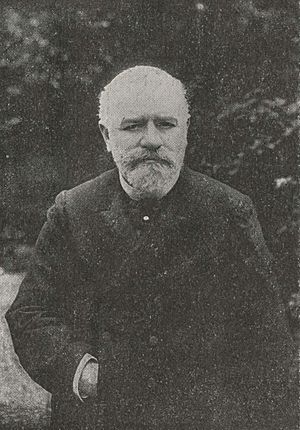Jan Gotlib Bloch facts for kids
Quick facts for kids
Jan Bloch
|
|
|---|---|
 |
|
| Born | July 24, 1836 |
| Died | January 7, 1902 (aged 65) |
Jan Gotlib (Bogumił) Bloch (Russian: Иван Станиславович Блиох or Блох) (July 24, 1836 – January 7, 1902) was a Polish banker and railway financier who devoted his private life to the study of modern industrial warfare. Born Jewish and a convert to Calvinism, he spent considerable effort to oppose the prevalent antisemitic policies of the Tsarist government, and was sympathetic to the fledgling Zionist movement.
Bloch had studied at the University of Berlin, worked at a Warsaw bank and then moved to St. Petersburg, capital of the Russian Empire (which governed much of the Polish lands at the time). There, he took part in the development of the Russian Railways, both in financing the construction of new railways and in writing research papers on the subject. He founded several banking, credit and insurance companies. In 1877 he was appointed a member of the Russian Finance Ministry's Scientific Committee.
Bloch was married to Emilia Julia Kronenberg h. Koroniec (1845-1921), the granddaughter of Polish banker Samuel Eleazar Kronenberg, daughter of medical doctor Henryk Andrzej Kronenberg and niece of industrialist and Polish nationalist Leopold Stanislaw Kronenberg; the Kronenberg and Bloch families had often been in competition with each other in several 19th century Polish businesses.
Influence
Bloch attended the first Hague Peace Conference in 1899, possibly at the invitation of Tsar Nicholas II, and distributed copies of his work to delegates from the diplomatic missions of 26 states, to little avail. The British publicist W. T. Stead also worked to spread Bloch's insights. In each particular, Bloch's theoretical research was rejected or ignored. To the British readers of The Contemporary Review, Bloch wrote in 1901:
Europe's patriots were unmoved. French cavalry and British infantry commanders only learned Bloch's lessons by a process of trial and error once Bloch's impossible war, World War I, had begun. The Russian and German monarchies proved equally incapable of assimilating Bloch's cautionary words concerning revolution, paying the price with summary execution and exile, respectively.
Bloch's foresight is somewhat qualified by what proved an underestimation of the tactical and strategic significance of indirect (e.g., artillery) fire, and his failure to foresee the development of the armoured tank and military aircraft. Bloch also did not realise the potential of non-rail motor-transport. None of these oversights was significant enough to undermine his broadest observations, however, for the period before about 1930.
He died on January 7, 1902, in Warsaw. An International Museum of War and Peace was established at Lucerne, Switzerland, in Bloch's name in the same year. The museum closed in 1919 due to a lack of visitors
Role in contemporary theory
Bloch survived long enough after publishing his theory to turn his analytical talents to investigating the institutional barriers which prevented the theory's adoption by the military establishment. He appears to have concluded that the military had to be sidestepped, by a more direct appeal to voters.
Contemporary theory treats Bloch as the Clausewitz of the early 1900s. A review in 2000 in the journal War in History concentrates on the interaction between Bloch's theory and the military professionals of the time. In short, it finds that they tended to dismiss Bloch, on the basis that, while his "mathematics" might be correct, his overall message ran the risk of being bad for morale.
See also
 In Spanish: Ivan Bloch para niños
In Spanish: Ivan Bloch para niños
- List of Poles
- The Great Illusion

